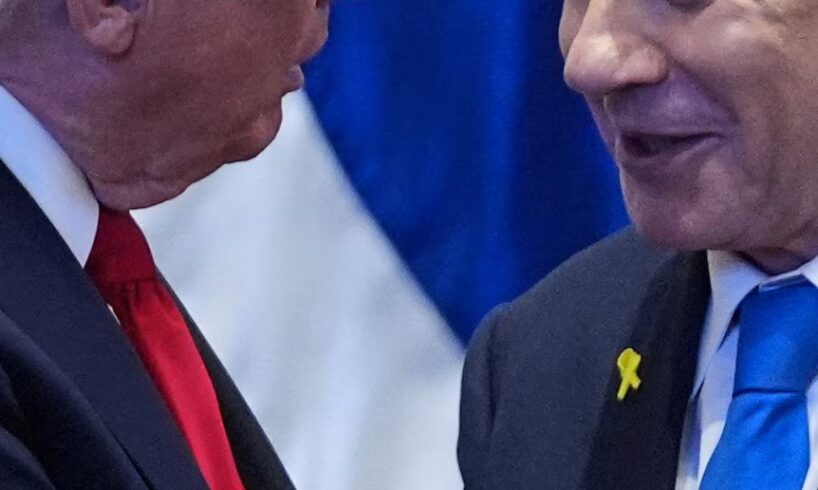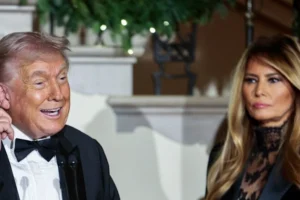
A couple rush to get ready for an evening out, waiting impatiently for the babysitter they’ve booked to arrive.
Then there’s a knock on the door. To their great surprise, Benjamin Netanyahu is standing in the hallway.
“You ordered a babysitter,” the Israeli prime minister says to the parents, their mouths agape.
“You got a Bibi-sitter!”
This was the premise of a campaign video for Mr Netanyahu’s Likud party ahead of the 2015 Israeli election.
The incumbent was making a pitch to hold onto power, saying only his party could protect the children of Israel and their future.
Loading…
Fast forward 10 years and the term “Bibi-sitting” has taken on a new meaning.
It is now detached from the notion of what Israel’s longest-serving prime minister is offering his country, and rather explains a phenomenon of close supervision by a foreign power — namely the United States.
Although that is something Mr Netanyahu has labelled “ridiculous”.
For much of last week, parts of Jerusalem and Tel Aviv were in gridlock — even more so than they usually are — as senior members of the Trump administration visited Israel.
It started with Special Envoy to the Middle East Steve Witkoff and the US president’s son-in-law Jared Kushner, fresh from the negotiations which landed the ceasefire and hostage exchange.
Days later there was the arrival of Vice President JD Vance and Second Lady Usha Vance, and the Secretary of State Marco Rubio jetted into town soon after.
The chairman of the US Joint Chiefs of Staff, General Dan Caine, will arrive this week.
US Secretary of State Marco Rubio arrived in Israel on Thursday, local time. (Reuters: Fadel Senna/Pool)
It’s not unusual for senior US officials to travel to Israel — particularly given the close ties between the two nations.
Mr Trump himself conducted something of a victory lap on the very day Israelis and Palestinians were being freed under the deal, spending just roughly eight hours on the ground.
But such a cavalcade of dignitaries in such a short amount of time is prompting fevered debate in Israel as to motive.
Hence, the re-imagining of the term Bibi-sitting as senior US officials seek to protect part of what Mr Trump sees as his peacemaking legacy.
“It’s not about monitoring in the sense of, you know, you monitor a toddler,” JD Vance said on Wednesday, standing right next to Mr Netanyahu.
“It’s about monitoring in the sense that there’s a lot of work, a lot of good people who are doing that work, and it’s important for the principals in the administration to keep on ensuring that our people are doing what we need them to do.”
Israeli PM slams babysitting claims as ‘ridiculous’
The characterisation that the US is “babysitting” Israel has seemingly angered Mr Netanyahu.
“Over the past month we have been witnessing ridiculous claims regarding the relationship between the United States and Israel,” he told a meeting of his government on Sunday.
“When I was in Washington it was said there that I control the American administration, that I dictate its security policy to it.
“Now the opposite is being claimed, the American administration controls me and dictates Israel’s security policy.
“Neither of these is true. Israel is an independent country, the United States is an independent country. The relations between us are relations between partners.”
JD Vance and Benjamin Netanyahu meeting at the prime minister’s office in Jerusalem. (Reuters: Nathan Howard/Pool)
It’s now just over two weeks since the ceasefire in Gaza came into force, and most — but not all — of the remaining deceased Israeli hostages have been released.
The remains of 13 Israelis are still in Gaza, with Hamas repeatedly warning of difficulties in retrieving them given how much of the war-ravaged strip has been razed to the ground.
Over the weekend, heavy machinery from Egypt was allowed into Gaza to help with the efforts to uncover the bodies.
Israel has decried the delays, labelling them a breach of the ceasefire deal.
But to this point, despite an apparent desire within the ranks of some in the political establishment to do so, the military has not been ordered to resume its bombardment.
Many in the Israeli media, and some analysts across the country, are putting this down to the Bibi-sitting which has been happening over this period.
It may be a phrase uttered partly in jest, but it speaks to the uncertainty about the days, weeks and months ahead, and how the Israeli government will manage the truce.
Analysis: The political theatre of Trump’s Middle East trip masks important questions
There has long been a fear amongst Palestinians, for example, that Israel would look for any opportunity to restart the war once the living hostages were freed.
A week after the ceasefire began, Israel launched a series of strikes across Gaza in retaliation for what it claimed were breaches of the agreement by Hamas.
In one instance, it said Hamas fighters opened fire on troops near the southern city of Rafah. Two soldiers were killed.
Israel rejected reports that the deaths had been the result of an Israeli excavator driving over unexploded ordnance.
Hamas distanced itself from the attack, saying it occurred in Israeli-controlled territory and it had had no contact with any of its militants in that area for many months.
As a result of the strikes, local health authorities said more than 40 Palestinians were killed.
For all the tough talk from the White House which followed in the days after, including comments from Mr Trump that Hamas would be “eradicated” if it broke the terms of the deal, the situation did not escalate further.
That is not to say that Israeli attacks have ended in Gaza. On Saturday, the IDF said it launched a strike in Nuseirat, in the centre of the strip, targeting a terrorist planning to attack its troops.
Many point to the continued Israeli attacks in Lebanon since a ceasefire was agreed with Hezbollah there in November last year as an example of how Israel would look to handle this truce.
It is perhaps why the US has set up a command centre in southern Israel, monitoring developments in Gaza.
Labelled a “cooperation centre” between the US and Israel, it is another example of the clear influence and oversight coming from Washington.
Fault lines form with West Bank annexation ‘political stunt’
There is a deep scepticism across the Arab world about the Netanyahu government’s intentions.
It is not only fuelled by the war in Gaza, which has led to an arrest warrant being issued by the International Criminal Court for Mr Netanyahu.
But Israel’s aggressive stance elsewhere in the region, and its clear territorial ambitions in the West Bank, continue to prompt unease.
In the middle of the so-called Bibi-sitting by Mr Vance, the vice-president was confronted with a preliminary vote in the Israeli parliament on effectively annexing the West Bank.
“If it was a political stunt it was a very stupid political stunt, and I personally take some insult to it,” he said.
“The West Bank is not going to be annexed by Israel, the policy of the Trump administration is that the West Bank will not be annexed by Israel.
“That will continue to be our policy, and if people want to take symbolic votes, they can do that — but we certainly weren’t happy about it.”
Settler attacks continue amid vote on West Bank annexation
The vote also prompted a statement by Mr Netanyahu’s office denouncing the vote and saying it was “a deliberate political provocation by the opposition to sow discord during Vice-President JD Vance’s visit to Israel”.
The statement was delivered in English in a clear sign it was for an international audience, and it insisted the legislation would not go further without his party’s support.
But members of his own coalition government champion the idea of annexation.
Finance Minister Bezalel Smotrich, not from Mr Netanyahu’s Likud party, is one of the most vocal.
In recent days Mr Smotrich has spoken about the need for proponents of annexation to take to the streets of Israel and protest for the cause — in a similar way to how the families of Israeli hostages in Gaza rallied for their release.
“Why is what is permitted for them forbidden for the right and the settlers?!” he asked in a lengthy post on social media platform X on Saturday night.
“Does anyone doubt that if, for an entire year, the many supporters of sovereignty went out every Saturday night to a ‘Sovereignty Square’ for a large rally, wore designed pins, covered the country’s roads and bridges with signs … would sovereignty not happen?
“I have no doubt about it. With God’s help.”
Loading
He suggested the US president had no idea how much the issue meant to the Israeli people, and could be swayed.
Mr Smotrich may well believe that. But it seems the White House clearly knows how much of a red line issue it would be for the Arab world.
“Don’t worry about the West Bank,” Mr Trump said when asked about the issue of annexation on Thursday.
“Israel’s not going to do anything with the West Bank.”
And you can bet the US will be keeping a close eye on that as it seeks to protect a deal the president wants as a key part of his legacy.





